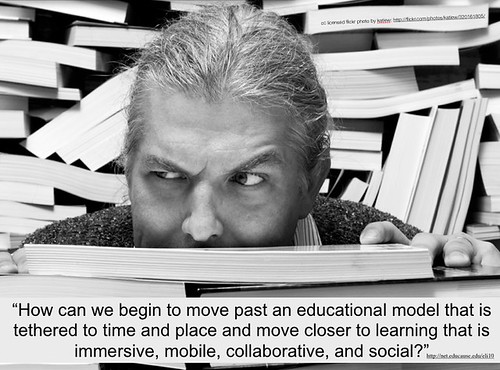My second post for the open course that I am participating in called Rhizomatic Learning that is being offered through Peer-to-Peer University (P2PU). The course is being facilitated by Dave Cormier, Manager of Web Communications and Innovation at the University of Prince Edward Island.
I absolutely love this week's theme of Enforcing Independence! The oxymoronic nature of the theme is clear like so many of the other contradictions we see daily in the world of education. However, it is equally clear that one of our primary goals in schools is (or should be) to help students develop the skills to be independent learners. In order to help support students in the development of these skills, we need to ensure that the educators in our schools have learning experiences where choice and learning with others are the norm and not the exception.
As someone who has a significant voice in the Professional Development offerings in my district, I spend a lot of time thinking about how to provide educators in our district with a greater degree of flexibility in leading their own learning. While we have had fleeting success with some learner-led days, we have not developed a formal structure where educators are able to create individualized plans that are flexible based on their needs.
Thinking about what our students need to be prepared for a world where things are changing at a speed that is sometimes incomprehensible makes it clear that our educational model needs an overhaul. We are educating our children and attempting to equip them with the skills that will allow them to be able to compete for a jobs that have yet to be created. The problem for me (and I'm guessing other who were educated in a traditional setting) is that I sometimes lack the vision for what is possible. My own experiences as a learner are a severe impediment to my thinking when it comes to preparing meaningful learning opportunities for staff members.
I agree with Dave's description of what the end result will be if we are successful in designing learning opportunities for our staff members:
"People need to self-assess and self-remediate. They need to be able to say that they don't understand something and then be able to figure it out. There is no freedom until people can do this(unfortunately) we have crushed it out of our education system."With this in mind, I have been reading a lot about the professional learning of adults and I have seen some models which I think could help give us a start on the right path. Shelly Blake-Plock was spot on in his post last month regarding PD fore teachers:
"The point of professional development shouldn’t be in having teachers check off a box that they attended a session or watched a video or took on a project. And it surely shouldn’t be in having an administrator check off a box for them. The point of professional development should be in helping human beings--who in this case happen to be educators--become more fully engaged and connected with their peers and fellow professionals. The goal should be helping them to develop the profession themselves."One of the more concrete examples of this comes from Albermarle, VA where the district is making teachers the architects of their own learning. Their Seven Pathways to Ensuring Life Long Learning Capacities for Every Child is a great model for other school communities to employ to ensure a greater degree of independence for learners. As we plan our PD opportunities for next year, I look forward to the challenge of providing our staff with these types of learning experiences.
Related articles


No comments:
Post a Comment